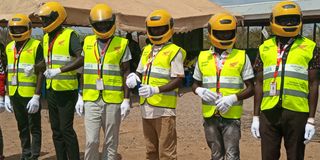UN Women trains boda boda riders on GBV prevention

Some of the boda boda operators in Kakuma who were trained on safety riding as well as GBV prevention and response on January 20, 2023.
What you need to know:
- UN Women Kenya in collaboration with Peace Winds Japan, Honda Motorcycle Kenya Ltd and the Automobile Association of Kenya trained 30 boda boda operators from Kakuma, on safety riding and GBV.
- The secretary of Kakuma Motorcycle Cooperative said training beneficiaries will become grassroots champions, rallying the community in Kakuma against gender violence.
Amida Feza, a refugee from Democratic Republic of Congo vividly recalls a horrific incident of domestic violence at Kakuma Refugee Camp in Turkana West Sub-county, on November 11, last year.
"We were awaken by a wailing woman in the middle of the night at Kakuma 1, Zone 1, Block 1. She was being beaten by her husband who claimed their two children were not his. I was shocked to see her lying unconscious, upon being hit with a metal bar," Ms Feza told Nation.Africa last week.
One neighbour, a boda boda rider, took the victim to hospital after an ambulance they had called to take her to Ammusait General Hospital, also known as Clinic Seven, delayed.
The rider, despite voluntarily saving the life of the woman, who was successfully treated and discharged, had to ride through a cemetery, a known hideout for criminals targeting boda boda operators and anyone walking on foot at night Ms Feza noted.
Emergencies
Ms Feza was among the locals present during an event where UN Women Kenya in collaboration with Peace Winds Japan, Honda Motorcycle Kenya Ltd and the Automobile Association of Kenya were training 30 boda boda operators from Kakuma town and refugee camp, on safety riding as well as gender-based violence (GBV) prevention and response.
The session was also to sensitize the operators on locations where response services could be accessed.
"Motorcycles are the most important means we rely on during emergencies, or day to day transport because they are affordable and easily access remote areas. It is important for them to be empowered through such safety training programmes and issuance of driving licenses," Ms Feza said.
UN Women Deputy Country Representative Idil Absiye, acknowledged boda boda operators as the first responders when it comes to GBV issues within Kakuma.
"We are, therefore, banking on boda boda operators because they are a key link in the transportation of survivors of gender-based violence to nearby health facilities. The 30 who have been trained will continue sensitizing another 3,000 operators registered in the Kakuma Motorcycle Cooperative during, and after the project period," Ms Absiye said.
The activity was part of UN Women's Leadership, Empowerment, Access and Protection in Crisis Response project supported by the Government of Japan. Among the project’s elements is to enhance protection of vulnerable refugee and host communities in Kenya.

A sign post of one of the women and girls' safe spaces run by International Rescue Centre organization in Kakuma.
A local chief Anah Ligoi, said she has participated in barazas whose objective has been sensitizing boda boda operators on prompt reporting of GBV incidents, and assuring survivors of justice.
"Through barazas, I speak against early marriages, which many elders still hold on as a culture. We tell them the bad side of early marriages, which denies children their right to enjoy their childhood and education," Ms Ligoi said.
Maclevis Ewoi, a boda boda operator and Kakuma Motorcycle Cooperative secretary, said those who benefitted from the training will not only be professional riders, but also grassroots champions rallying the community in Kakuma against GBV.
"Our mothers, sisters, neighbours and friends are highly vulnerable to rights violations, with frequent cases of sexual and gender-based violence (SGBV) occurring at unmanned water points, when collecting firewood, in dark streets, or at home. We will wholeheartedly provide our services when need arises, as well as talk to our peers against perpetrating the vice," Mr Ewoi said.
He called on officials from the national and county governments, who were present, to support more of them to obtain licenses, something that has been difficult to achieve due to financial and documentation challenges.
UN Women’s partner on GBV response, International Rescue Committee (IRC) sensitized the operators on GBV referral pathways.
IRC has, since the project's inception in November 2021, provided services to more than 3,000 survivors at their two GBV one-stop centres and two women’s safe spaces.
UNHCR Protection Officer, Robin Masinde Lyambila, said the boda boda operators who benefitted from the training were from the refugee camp and host communities, something he said would translate to a positive impact within Kakuma/Kalobeyei municipality.





